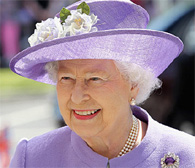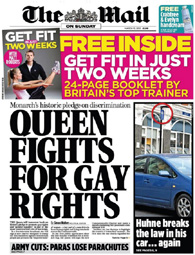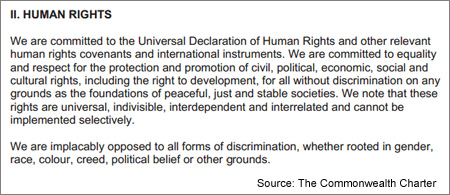Headlines last weekend in the UK and around the world praised Britain's Queen Elizabeth II for "fighting for gay rights" by signing the charter that sets out the Commonwealth's values and commitment to equal rights although the document itself makes no mention sexuality or sexual orientation.


The Queen on Monday signed a new Commonwealth Charter that contains the following: "We are implacably opposed to all forms of discrimination, whether rooted in gender, race, colour, creed, political belief or other grounds."
The phrase "on other grounds" is said to include sexual orientation or gender identity, according to the UK's The Mail newspaper which declared on its frontpage on Saturday "Queen fights for gay rights". It quoted unnamed insiders who said "her decision to highlight the event is a ‘watershed’ moment – the first time she has clearly signaled her support for gay rights in her 61-year reign."
The report added: "The 'other grounds' is intended to refer to sexuality – but specific reference to 'gays and lesbians' was omitted in deference to Commonwealth countries with draconian anti-gay laws."
When contacted by Fridae, a spokesperson for the Commonwealth Secretariat said: “The notion that the Queen has pledged to promote gay rights is an interpretation that certain publications who have reported this have formed on their own.”
“The Commonwealth Charter speaks to the values and principles of the Commonwealth generally. It does not mention gay rights specifically, but rather human rights more broadly.”
A Palace spokesperson reminded the public: “The Queen does not take a personal view on these issues. The Queen’s position is apolitical, as it is in all matters of this sort.”
The charter, which was drawn up for the first time, includes affirmations on democracy, human rights, international peace and security, and freedom of expression as well as a commitment to "gender equality" and “women’s empowerment”.
It was adopted by all 54 member states, which accounts for 30% of the world's population, in December.
Human rights campaigner Peter Tatchell told HuffPost UK that it was a "bit of a stretch" to see this speech and charter as a declaration in support of gay rights from the Queen.
"She's made no such explicit commitment and not used any such words."
"While I doubt that Elizabeth II is a raging homophobe, she certainly doesn't appear to be gay-friendly. Not once during her reign has she publicly acknowledged the existence of the LGBT community."
Tachell added: "Indeed, in her 61 years on the throne, the Queen has never publicly uttered the words lesbian or gay. She is a patron of hundreds of charities but none of them are gay ones. Not once has she visited or supported a gay charity."

Forty-one of the 54 Commonwealth countries including Singapore, Malaysia and Sri Lanka still criminalise homosexuality, mostly under laws imposed by Britain during the colonial era. Of the 54, two sentence gay people to death, one tortures them with flogging while five impose life sentences. Uganda, also a Commonwealth member country, is currently considering legislation that would introduce the death penalty for repeat “gay offenders”.
In his column “The Queen defending gay rights? She can't even say the words out loud” for the Guardian newspaper, Patrick Strudwick wrote: “By refraining from using the word gay or gay rights, the head of the Commonwealth will in fact silence opponents of equality!
“Fighting for gay rights? The Queen won't even mention them. She dare not speak our name – that is, if you believe she is even referring to gay people; if you buy the newspaper's inference that "other grounds" denotes an "implicit support of gay rights". “No, to refrain from specification is to collude with silence, the Grand Pause that keeps lesbians and gay men invisible, suffocating in marriages of inconvenience or trapped in police cells.”
Tim Marshall, Foreign Affairs Editor of Sky News wrote: “The Queen is not signing a new charter 'backing equal rights for women and gay people in every Commonwealth nation', despite headlines to the contrary.”
“The words "other grounds" are being seen by some as including sexuality. However, they can interpret it that way as much as they wish. The fact that "sexuality" is not spelled out will allow homophobic governments to retain laws currently used to suppress forms of sexuality they see as threatening.”
